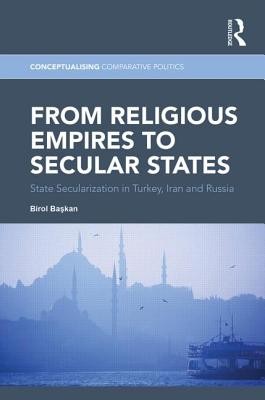
- We will send in 10–14 business days.
- Author: Birol Başkan
- Publisher: Routledge
- ISBN-10: 0415743516
- ISBN-13: 9780415743518
- Format: 16 x 22.9 x 2 cm, kieti viršeliai
- Language: English
- SAVE -10% with code: EXTRA
Reviews
Description
In the 1920s and the 1930s, Turkey, Iran and Russia vehemently pursued state-secularizing reforms, but adopted different strategies in doing so. But why do states follow different secularizing strategies? The literature has already shattered the illusion that secularization of the state has been a unilinear, homogeneous and universal process, and has convincingly shown that secularization of the state has unfolded along different paths. Much, however, remains to be uncovered.
This book provides an in-depth comparative historical analysis of state secularization in three major Eurasian countries: Turkey, Iran and Russia. To capture the aforementioned variation in state secularization across three countries that have been hitherto analyzed as separate studies, Birol Başkan adopts three modes of state secularization: accommodationism, separationism and eradicationism. Focusing thematically on the changing relations between the state and religious institutions, Başkan brings together a host of factors, historical, strategic and structural, to account for why Turkey adopted accommodationism, Iran separationism and Russia eradicationism. In doing so, he expertly demonstrates that each secularization strategy was a rational response to the strategic context the reformers found themselves in.
EXTRA 10 % discount with code: EXTRA
The promotion ends in 23d.00:10:59
The discount code is valid when purchasing from 10 €. Discounts do not stack.
- Author: Birol Başkan
- Publisher: Routledge
- ISBN-10: 0415743516
- ISBN-13: 9780415743518
- Format: 16 x 22.9 x 2 cm, kieti viršeliai
- Language: English English
In the 1920s and the 1930s, Turkey, Iran and Russia vehemently pursued state-secularizing reforms, but adopted different strategies in doing so. But why do states follow different secularizing strategies? The literature has already shattered the illusion that secularization of the state has been a unilinear, homogeneous and universal process, and has convincingly shown that secularization of the state has unfolded along different paths. Much, however, remains to be uncovered.
This book provides an in-depth comparative historical analysis of state secularization in three major Eurasian countries: Turkey, Iran and Russia. To capture the aforementioned variation in state secularization across three countries that have been hitherto analyzed as separate studies, Birol Başkan adopts three modes of state secularization: accommodationism, separationism and eradicationism. Focusing thematically on the changing relations between the state and religious institutions, Başkan brings together a host of factors, historical, strategic and structural, to account for why Turkey adopted accommodationism, Iran separationism and Russia eradicationism. In doing so, he expertly demonstrates that each secularization strategy was a rational response to the strategic context the reformers found themselves in.


Reviews